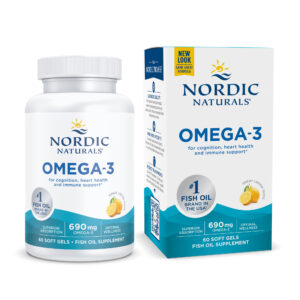Proving they’re “essential” as well as innovative, manufacturers say EFA supplements are in it for the long haul.
Omega-3 supplements are seeing greater consumer adoption and reaching a broader demographic than ever before, largely based on mounting research about their benefits. In addition to increased public education about EFAs (essential fatty acids), there is also a trend toward preventing costly chronic health conditions through improved nutrition. Many people rely on their physician to recommend what they should be taking and omega-3s are at the top of many physicians’ lists of recommended supplements. As a result, omega-3s are one of the most popular supplements, if not the most popular, that people add to their regimen.
“Sales in the EFA category continue to grow fairly strongly,” said Marci van der Meulen, national sales manager— retail division with California-based Nordic Naturals. “Predictions for growth this year are between 10 and 15 percent, depending on the type of product and whether it is a supplement or a functional food. We have seen very healthy growth in sales of our omega-3 supplements and don’t anticipate any slow down.”
Product Evolution
The demographics of consumers purchasing EFA supplements are changing. “We used to think of the EFA consumer as an older consumer concerned with heart health or joint health, but we see this broadening to other categories, including women’s and children’s health,” said Angelica Vrablic, PhD, manager of nutrition research with New Jersey-based Solgar.
Sales still predominantly reside with Baby Boomers and the middle-aged population, van der Meulen added. “But, the younger generations are becoming more aware of the health benefits of omega-3s and are starting to open their eyes a bit more to EFA supplementation. We are also seeing growth in our children’s products as parents determine they want their children to experience the many health benefits of omega-3s.”
For Canadian-based Vega, the Vega Antioxidant Omega Oil is an innovative product due to the inclusion of the antioxidant-rich botanical seed oil blend—a key differentiating factor compared to other plant-based fatty acid supplements, said Emma Cutfield, product education manager. “Not only does the antioxidant seed oil blend add phytosterols to the product, but it adds a pleasant flavor uncommon in other oils while enhancing shelf life,” she said.
Cutfield has found through recent market research indications that consumers do not widely understand the terms “EFA” or “essential fatty acids,” but instead have a much clearer understanding of the term “omega” and associate the health benefits of essential fats with it. “In recognition of this, our most recent development with our fatty acid supplement (originally called Vega Antioxidant EFA Oil Blend) was to rename the product in conjunction with our rebrand and packaging change.”
At Nordic Naturals, van der Meulen offered that the company is continuing to expand its delivery options. “While many folks are experiencing pill fatigue, they are aware of the health benefits of EFAs,” she said. “So, they are looking for new and unique ways to consume their EFAs through delivery systems such as gummies, jellies/ chews, concentrates, vegetarian products, powders, etc.”
The company recently introduced Nordic Omega-3 Jellies™ that take advantage of new emulsification technology. “It results in a product that is fun, tasty and chewable for kids, with the high omega-3 concentration and on-the-go convenience parents are looking for when shopping for supplements for their children,” said Tone Larsen, the company’s product development manager.
What’s taking the market by storm are Barlean’s liquids, algae-based DHA and salmon oils, according to John Patrick Kenny, MS, nutrition and product educator with Super Supplements in Seattle, WA. “A ’new format’ of note would be Barlean’s swirls, which are now also available in single-serve packs. There’s a lot of gummies (adults and kids) on the market, and they are picking up sales, but they are not a big part of the market for us. The other ‘new (not) format’ would be a onea- day cap.”
With liquids comprising about 27 percent of all EFA SKUs at Super Supplements and pills about 61 percent, Kenny noted that the smallest segment is the fastest growing: whole and ground flax seed, up 16 percent.
Potent Choices
Also garnering attention in the category are high potency EFA supplements. “Consumers are becoming aware of recommendations for concentrated doses of omega-3s,” Larsen said, noting that in addition to the company’s best-selling concentrate line, Ultimate Omega®, and in response to increasing demand for concentrated products, Nordic has introduced Complete Omega-3.6.9™ Xtra. Laura, a sales associate with Sunny Bridge Natural Foods in McMurray, PA, said these types of products—notably Ultimate Omega—are definitely showing strong sales in the store.
It’s a trend also picked up on by Solgar, according to Vrablic, who said the company is seeing more concentrated products such as double strength or triple strength fish oil concentrates as consumers look for specific doses of omega-3 EFAs.
“The classic 18:12 (180 EPA/120 DHA) potency that dominated the market in the early days of fish oils supplements has been joined by higher potency products that provide 500, 600, even 1,000 mg of EPA/DHA per serving,” added Jolie Root, nutritionist and educator with Illinois-based Carlson Laboratories. “Larger capsules that provide 1,250 mg of oil, and thus higher concentrations of active omega-3 (EPA/DHA), have been introduced and are seeing strong sales.”
In addition, new sources of omega-3 fish oils are entering the market, such as krill, squid and menhaden oil, which all provide unique qualities. Carlson Laboratories recently introduced calamari oil, which is higher in DHA, promoting brain, eye and heart health, and virgin Norwegian salmon oil, which provides omega-3, 6, 7 and 9, and the antioxidant astaxanthin, to the North American market.
Another trend, according to Jodie Howard, director of marketing with California-based Coromega, is “easy-toconsume” EFA supplements, such as emulsions, liquid oils and blends of omega-3 with other nutrients such as vitamin D. “We have seen more omega- 3 concentrates entering the field, and there is much more attention to innovative delivery systems,” said Howard. “An example of this trend is Coromega Omega3 + D Squeeze, which combines a daily dose of omega-3 (650 mg) with a daily dose of Vitamin D (1,000 IU).”
Recent Research
There’s been plenty of current research casting light on the benefits of omega- 3s. “Very interesting studies that link omega-3s to learning in children continue to emerge,” said Nordic Naturals’ Larsen. “In September, the University of Oxford released results from its DHA Oxford Learning and Behaviour (DOLAB) Trial, which suggests that supplementation with DHA is a simple and effective way to improve reading and behavior in healthy but underperforming children. This type of research is no doubt contributing to growth in the market for omega-3 supplements for children.”
Coromega Scientific Advisor Dr. Doug Bibus offered that the military is now taking a serious look at the potential effects of long-chain omega-3 for the treatment and prevention of traumatic brain injury, but more importantly, posttraumatic stress disorder, depression and the incidence of suicide. “Dr. Joe Hibbeln from the NIH (National Institutes of Health) is one of the key researchers in this field who is working closely with the U.S. Army,” he said, adding that a few other noteworthy studies link low blood levels of omega-3 with increased risk for dementia and Alzheimer’s disease.
There was negative news as well when a meta-analysis published in September in the Journal of the American Medical Association (JAMA) suggested that omega-3s did not lower the risk of all-cause death, cardiac death, sudden death, heart attack or stroke. The study drew considerable industry reaction, but didn’t seem to affect EFA supplement sales. “We have heard very little in the way of negative feedback from our consumers or retailers,” said Keri Marshall, MS, ND, chief medical officer with Nordic Naturals. “Those consumers that we have spoken with tell us they will continue to take their omega-3s because they have made a clear difference in their lives in so many ways.”
Retailer Kenny said he did see a mixed reaction from customers, but only in select stores. “Some stores had no one commenting on the study, while others had a few customers discrediting the study on their own. On one hand, we had some customers that required further education to understand the benefits of fish oils, but then we had a customer express [he] felt like it was a waste of money to take fish oil.
“In the end, having Dr. Oz tell people to continue taking their fish oil definitely helped,” Kenny added.
Manufacturers agree that the JAMA study should not discourage consumers from taking fish oil supplements. “The study did trend toward benefit, showing an eight percent reduction in cardiac death with omega-3 fatty acid supplementation, as well as a 13 percent reduction in sudden death, an 11 percent reduction in heart attacks and a four percent reduction in all-cause mortality,” Marshall explained. “Because this study shows that omega-3 supplementation does not cause harm—it is important to understand that even a small benefit would be valuable at the global public health level. When spread across an entire population, research on fish oil supplementation has been shown to reduce overall cardiac risk and even provides modest protection. For some, it may even be life saving.”
Additionally, with more than 8,000 studies to date on fish oil, there is ample evidence showing benefits across all parameters of health and wellness, including cognitive health, childhood brain development, immune health, mood, joint and musculoskeletal support, and overall inflammation, Marshall pointed out. “EFAs are demonstrated to be vitally important essential nutrients that we should all strive to get into our diets daily.”
“Retailers should understand that these types of studies are difficult to interpret because they involve patients that were taking prescription medications, and some with serious health concerns,” said Solgar’s Vrablic. “Addition, this study lumped many different patients, with different health concerns, and different intakes of EFAs all together, so it is not surprising that the conclusions are difficult to interpret.”
Enduring Products
The notion of “plenty of fish in the sea” doesn’t hold true of late, and companies are helping to ensure sources aren’t over exploited. Nordic Naturals said it is committed to sustainability in all aspects of its operations and has been since the company’s founding. “We use only wildcaught, sustainably sourced fish, including Arctic cod (skrei), Pacific sardines, Peruvian anchovies, and Alaskan pink and sockeye salmon,” said Larsen. “The microalgae we use is non-GMO, hexanefree and sustainably cultivated.
“One hundred percent of our fish is sourced in line with the Norwegian fisheries management system, which has been a model of sustainability for more than 30 years,” she added. “We also protect against by-catch of unintended species by using responsible fishing gear; we use line and net fishing methods to prevent seafloor and ecosystem damage; and we ensure our coastal processing facilities are leaders in minimizing pollution and conserving resources.”
The types of fish oil that is sourced for Coromega come from deep-water anchovies and sardines caught off the coast of Chile, said Howard. Not only are these fish from a sustainable fish stock, they are a short-lived species that tend to have lower exposure to environmental toxins.
Alexandra Charles, director of education with Texas-based Essential Formulas/Dr.Ohhira’s Probiotics, noted that in the past year there was a 70 percent growth in krill oil. “However, there are monumental concerns about the sustainability of krill oil production. EFA manufacturers are going to have to shift toward more sustainable sourcing, such as algae and plant-derived forms of EFAs, or sustainable animalderived sources like krill.”
And many consumers are forgoing fish altogether. “With rising concerns over the sustainability of fish oil production and eco-system damage caused by over-fishing, many people are turning to plant- or algae-derived sources of EFAs,” Charles noted.
“People are now populating a market once comprised only of vegans and vegetarians with concerns over mercury levels, farm-raising fish, GM (genetically modified) fish and sustainability as well. A survey conducted by Discovery Research Group revealed that nearly four out of 10 consumers who want to take an omega-3 supplement are looking for an alternative to fish oil.
Solgar said it, too, is finding significant presence of non-fish derived EFA supplements, such as algal, flax, evening primrose and borage oils. Nordic Naturals has also responded to this trend by developing vegetarian products, Algae Omega™ and Baby’s DHA Vegetarian, which are made from microalgae, and are suitable for individuals who follow a vegetarian or vegan diet, or who want the benefits of marine omega-3s without consuming fish.
Another option is Vega’s Antioxidant Omega Oil, which features hemp seed oil as one of the main omega-3 and omega-6-rich sources. “Hemp is a sustainable crop as it is naturally resistant to crops and is not necessary to treat with pesticides or herbicides,” Cutfield noted. “In addition, the hemp oil used in our oil blend is used after extraction (cold pressing) from the whole hemp seed. The protein meal remaining (after the cold pressing) is used in our protein blend for Vega One, Energizing Smoothie and Sport Performance Protein. This has a tremendous impact on sustainability, as there is limited raw material waste throughout processing.”
The ingredients in Vega Antioxidant Omega Oil are also primarily sourced from domestic (North American) suppliers, lowering the carbon footprint of transporting raw materials to manufacturing facilities. The exceptions are the coconut oil (Philippines) and green tea seed oil (China).
Communicating at Retail
Explaining EFAs to customers can be a challenge, and retailer Kenny said some top concerns are fish burps, potency of product, how “clean” it is, heavy metal concerns and the difference between animal and plant oils.
But van der Meulen suggested that the first basic information for retailers to share with consumers is that essential fatty acids are considered “essential” because they are required for optimal health but cannot be produced by our bodies, and, therefore, must be consumed daily through diet or supplementation.
“The EFAs we consume reside in our cell membranes, where they impact every biological process in our bodies— such as cell division, circulation and blood pressure, and inflammation,” she said. “With adequate intake of essential fatty acids, cells function properly, and overall health is supported.” Retailers are encouraged to ask their sales rep about the educational brochures and product literature Nordic Naturals provides.
Also, retailers should let customers know that omega-3 supplementation is not only beneficial to cardiovascular and brain health, said Essential Formulas’ Charles. “There is an increasing body of evidence linking the omega-3 essential fatty acids DHA and EPA with improvements in human brain function, improvements in memory, learning abilities and disabilities as well as a range of psychiatric and other mental conditions. But EFA products can be used to support the body’s whole health. EFAs are literally important to the function of every single cell in the human body.”












